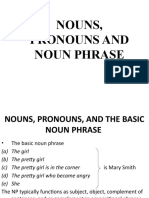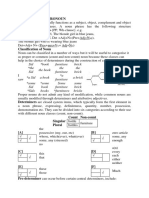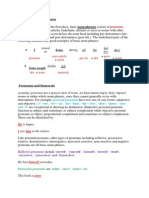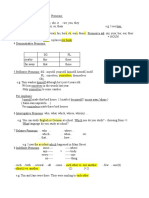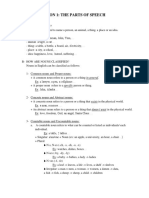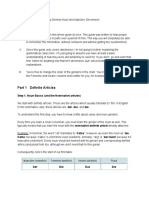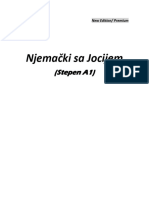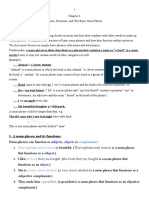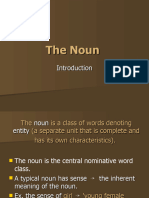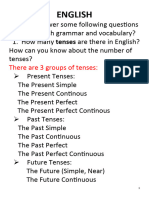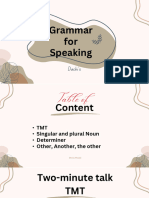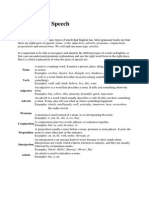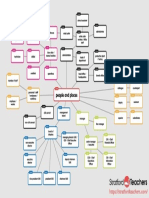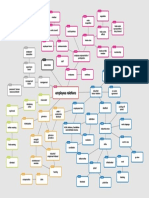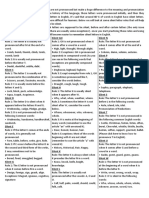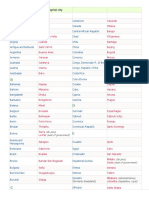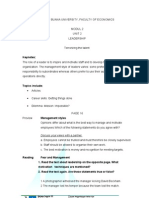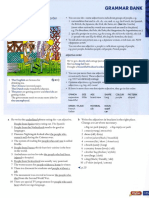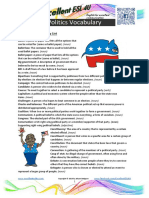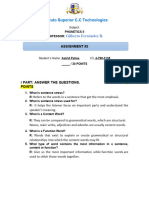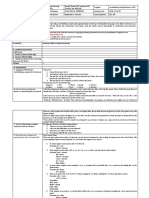English Grammar: Group Members
English Grammar: Group Members
Uploaded by
baphong593Copyright:
Available Formats
English Grammar: Group Members
English Grammar: Group Members
Uploaded by
baphong593Original Description:
Original Title
Copyright
Available Formats
Share this document
Did you find this document useful?
Is this content inappropriate?
Copyright:
Available Formats
English Grammar: Group Members
English Grammar: Group Members
Uploaded by
baphong593Copyright:
Available Formats
English Grammar
Group members:
1. Le Thi Hoai Thanh
2. Nguyen Hanh Le
3. Tran Thi Ut Tram
4. Hoang Thi Thu Huong
5. Le Thi Thu Phuong
6. Nguyen Thi Thu Trang
Definition : Nouns are words that name people, places,
things, or ideas.
thing
Noun classes
idea
person Proper Common
nouns nouns
place
Proper nouns
Personal geographical calendar institutions/
names names items organizations
Bill Clinton the Nile Easter the UNICEF
Common nouns
Count Ns Non-count Ns
car Singular
Singular
cars Plural
salt
Noun classes
Proper nouns Common nouns
E.g. Tom, John
Count Ns Non-count Ns
Singular Plural Singular
table tables freedom
Definition: A noun phrase is a group word with a noun or a
pronoun as the head & other constituents as modifiers.
Example: The second black bag on the table is very nice.
art numeral adj head PP
Functions: noun phrases perform 6 major
grammatical functions in the English language:
1. Subject: This book is very interesting.
S
2. Direct Object: Mary kicked the ball.
Od
3. Indirect Object: He gives his father a hat.
Oi
4. Subject Complement
Ex: He is a student.
S Cs
5. Object Complement:
Ex: We elected you team leader
O Co
6. Prepositional Complement
Ex: I work in this company.
PP Cpp
Basic NP
(Determiners) + Head noun
Determiners = words of close-system used before a
N to “determine” the precise meaning of
the N.
Pre-determiners
( Central ) Determiners
Post-determiners
Pre-determiners All, Both, Half
Multipliers
Fractions
such , what (exclamative).
Pre-determiners All, Both, Half
+ Before: - Articles ( a, an, the, zero articles)
Ex: All the time
- Possessive determiners (my, her ,his, etc.)
Ex: Both his sisters
- Demonstrative determiners ( this, that, these, etc.)
Ex: Half those days.
+ Not before: Quantitative determiners (no, each, any, some,
enough, (n)either, every)
Pre-determiners All, Both, Half
+ Take partitive “ of-phrases” Optional with Nouns
Ex: All (of) the time
Obligatory with pronouns
Ex: All of them, both of us, Half of it
+ “All, both” occur after head, either immediately or after the operator
Ex: They (all) were (all) accepted.
Pre-determiners Multipliers Once, twice, three
times, double, etc.
+ Used to denote the quality of the nouns
Ex: Twice his strength
Double their papers
+ Occur with the determiners “a, every, each” and “per”
to indicate frequency.
Ex: Once a week
Twice every day
Three time each year
Pre-determiners Fractions one-third, two-fifths,
three- quarters, etc .
+ The fraction have the alternative of-construction.
Ex: One-third (of ) the time .
Two-fifths (of) the students.
+ The indefinite article can replace “one”
Ex: He did it in one-third/ a third of the time it took me
Pre-determiners such , what (exclamative).
+ Occur before the head noun .
+ “ Such” combined with “all/no, quantifiers,
cardinal numbers”
Ex:No/many/30 such incidents
( Central ) Determiners
(1) (2) (3) (4) (5) (6)
Possessiv
e : My, Zero (A)n every,
our, her, Article each,
.etc...Wh- This, , Those much
some, (n)either
words, any That These
some, any (unstress
(stressed), ed)
no enough
(central) Determiners respect to their co-
occurrence with the noun classes
Count Non-count
SINGULAR bottle
furniture
PLURAL bottles
( Central ) Determiners
Ex:
(1) The Possessive („my‟,
„your‟, 'his‟, etc.) Book
Genitive („my father‟s‟,
„Anne‟s‟, etc.)
Possessiv
No + Books
e : My,
our, her,
Whose
.etc... Which (ever)
What (ever)
Some (stressed) Ink
Any (stressed)
( Central ) Determiners
Ex:
(2)
Zero article
Zero
Some Books
Article
some, (unstressed) +
any Any ink
(unstress
ed)
(unstressed)
enough enough
( Central ) Determiners
Ex:
(3)
An/a Book
(A)n every, every
each,
each +
(n)either ink
either
neither
( Central ) Determiners
Ex:
(4)
This Book
+
This,
That
That ink
( Central ) Determiners
Ex:
(5)
Those Book
+
, Those
These
These
ink
( Central ) Determiners
Ex:
(6)
Much + Ink
much
Post-determiners
Cardinal numerals
Ordinal numerals
closed-system quantifiers
Opened-system quantifiers
Post-determiners
Cardinal numerals
- Apart from One , which can co-occur only with singular
count nouns , all cardinal numerals ( two, three...) co-
occur only with plural count nouns:
Ex: The two students The two cars
Det post-det head Det post-det head
Post-determiners
Ordinal numerals
-In addtion to the ordinals which have a one-for-one relation with the
cardinals ( fourth~four; twentieth-twenty), we consider here items like next,
last, (an) other, additional, which resemble them grammtically and
semantically.Ordinal numerals, exept first, co-occur only with count nouns.
Ex: The first three planes His last two book
Det post-det head Det post-det head
Post-determiners
close-system quantifiers
-Before count Ns: many , (a)few, several
-Before non-count Ns: much, (a) little
Ex: The few words Much stress
Det post-det head post-det head
Post-determiners
Open-system quantifiers
-Include : plenty of, a lot of, lost of, a great of, a large
of etc.
-Verbs have number concord with the second nouns
, not the quality nouns (lot, deal, lost, plenty, etc.)
Ex: Lots of food was on the table.
There was a lot of food on the table
I. Structure
- Noun phrases play an important role in the construction
of a sentence.
- Basic noun phrases can be pronouns, numerals or head
nouns with different determiners while complex ones
include pre-modification, head noun and post-
modification
Complex NP
Pre- Post-
+ Head noun + modification
modification
E.g.: All the 11 pupils playing football
Pre-modification Head noun Post-
modification
Three Three men In a boat
The Italian Expression For coffee
A Pen On the table
Modifiers before the noun are called pre-modifiers. All of
the pre-modifiers that are present and the noun together
form a noun phrase .
NOUN PHRASE
pre-modifiers noun
* ←
white house
* ←
large man
* ←
post -modifiers—modifiers coming after a noun.
a dream deferred
→ *
A "head noun" is the main noun that is modified by other
elements in a noun phrase.
It is important that you can find head nouns, because this
allows you determine whether the phrase can take an
indefinite article (if the head noun is a noncountnoun, then it
cannot occur with 'a' or 'an')..
Like in the basic noun phrase, the head noun, first of all, is
the central element and core component of the complex
noun phrase.
It may be count or mass noun which dictates concord and
(for the most part) other kinds of congruence with the rest of
the sentence outside the noun phrase.
Ex: The only girl in this class is hard working
head
- All of the beautiful girls in my class are kind
- I like the car that you bought.
Car is the head noun because the adjective
clause modifies it.
.
Look at these examples. The head nouns
are underlined. Notice that the head noun is NOT
the noun right before the adjective clause.
Ex:. The people in Japan I met were very polite and
friendly.
Modification
function status
Restrictive Permanent
Non-restrictive Temporary
Modification
• helps identify the head & indicate a
function limitation on the possible reference
status of the
head
Restrictive • tends toPermanent
come after the head
• tends to be given more prosodic emphasis
than the head
Non-restrictive Temporary
E.g.: The flowers in your garden are nice.
He visited his aunt who often lent
him money.
Modification
• gives additional information to the head
but is not essential for identifying the
function status
head
Restrictive • the reference: unique or as member of a
Permanent
class that has been independently identified
• tends to come before the head
Non-restrictive • tends to beTemporary
unstressed in pre-head position
E.g.: The book, which I gave you yesterday,
is quite readable. (member of a class)
She is his poor, old mother. (unique)
Modification
function status
• Have reference to characteristic
features Non-restrictive Permanent
• Mainly the items which are placed
in pre- Restrictive Temporary
modification position
E.g.: an ugly man
the easy-going lady
Modification
• Havefunction
reference only to a specific status
time
• Mainly those adjectives which have
Non-restrictive Permanent
to be
predicate Restrictive Temporary
E.g.:
A man who is timid = A timid man
A man who is afraid # An afraid man
•Pre- modification including modifiers that stand before the
head off complex NP.
• modifiers is a word (adj, adv…) that describes an other
word or group of words or restrict its, meaning in some
way. IT is the unit of forming a structure element.
• modification is the act or process of changing
something in order to improve it or make it more
acceptable. It is the structure element
Premodification
Predeterminer
Determiner
Determiner
Adjectives
Post-determiner
participle
Adverbial
Noun modifier
Sentence
Multiple premodifi-cation
Overview
Premodification
Predeterminer
determiner Determiner
Determiner Post-determiner
participle
Adverbial
Sentence
Noun modifier
Multiple premodifi-cation
opinion
Premodification
size
Determiner
Adjectives age
participle
shape
Adverbial
color
Sentence
origion
Noun modifier
material
Multiple premodifi-cation
purpose
opinion
Premodification
Beautiful, good
Size
Determiner
Adjectives age
participle
shape
Adverbial
Color
Noun modifier
origin
Sentence
material
Multiple premodifi-cation
purpose
opinion
Premodification
size
Determiner Big, small
age
Adjectives
participle shape
Adverbial Color
Noun modifier
origin
Sentence
material
Multiple premodifi-cation
purpose
opinion
Premodification
size
Determiner
age
Adjectives
Big, small
participle shape
Adverbial Color
Noun modifier
origin
Sentence
material
Multiple premodifi-cation
purpose
Premodification opinion
size
Determiner
age
Adjectives
Old, young
participle shape
Adverbial Color
Noun modifier
origin
Sentence
material
Multiple premodifi-cation
purpose
Premodification opinion
size
Determiner
age
Adjectives
participle shape
Square, round
Adverbial Color
Noun modifier
origin
Sentence
material
Multiple premodifi-cation
purpose
opinion
Premodification
size
Determiner
age
Adjectives
participle Shape
Adverbial Color
Blue, red…
Noun modifier
origin
Sentence
material
Multiple premodifi-cation
purpose
opinion
Premodification
size
Determiner
age
Adjectives
participle Shape
Adverbial Color
Noun modifier
origin
Sentence English, chinese
material
Multiple premodifi-cation
purpose
Premodification opinion
size
Determiner
age
Adjectives
participle Shape
Adverbial Color
Noun modifier
orifin
Sentence
material
Multiple premodifi-cation metal.,
purpose
opinion
Premodification
size
Determiner
age
Adjectives
participle Shape
Adverbial Color
Noun modifier
orifin
Sentence
material
Multiple premodifi-cation metal.,
material
article opinion size age shape color origin material purpose noun
1. a silly old English man
2. a huge round metal bowl
3. a small red sleeping bag
Premodifying
intensifying
adjective
a real hero, a definite loss, a
Gennerally complete fool, a close friend
attribute only reverse
restrict the reference a certain person
Restrictive of the noun the exact answer
adjectives exclusively, the only occasion
particularly or chiefly the very man.
attributive only
adjectives which
cannot pre-modify faint, ill, well,
the head, but can be able, afraid,etc.
predicative
Premodification by participle
Premodification
Determiner
adjective -ing
participle
Adverbial -ed
Noun modifier
Sentence
Multiple premodifi-cation
Premodification by participle
-ing participle: temporary: the approaching train
(=the train which is approaching)
Permanent: an interesting book
(=a book that interests readers).
-ed participle: passive: the broken vase
(=the vase that was broken)
Non-passive: a retired teacher
(=a teacher who has retired)
Premodification by adverbs
Premodification
Determiner
adjective
participle
adverbial
Noun modifier
Sentence
Multiple premodifi-cation
Standing before noun to modify it.
The chidren are playing nearly house
My house have to go to far-away school.
Eg: I visited his far-away hometown.
Overview
Premodification
Determiner
adjective
participle
adverbial
Noun modifier
Sentence
Multiple premodifi-cation
Noun modifiers
“a children book”
“a children book” means a book for children
the city council, the love story…
Or I bought a new computer game
In these cases the noun pre-modifier is closely connected to the
head noun that the two can almost be considered one word.
This illustrates that when nouns pre-modify other nouns they
always come next to the head noun ; nothing else can come
between them
Overview
Premodification
Determiner
adjective
participle
adverbial
Noun modifier
sentence
Multiple premodifi-cation
Sentence modifiers
I gave him “I don’t know” answer.
I got angry with his I-don’t-care
attitude.
Overview
Premodification
Determiner
adjective
participle
adverbial
Noun modifier
Sentence
Multiple premodifi-cation
Multiple premodifi-cation
Premodifiers head noun
Deter adj participle denonial
Predet det postdet gen age col shape… -ing/-ed adj noun
This beautiful new white Japanese cat.
The old pentagonal crumbling church tower.
+ multiple head with one modifier
Old man and women
+modified modifier
A noun can be premodified by either adjective or noun….
The meat production increase measures.
The extremely beautiful pictures.
Definition of post – modification
Post – modification ( also called post – modifiers )
comprising all the items placed after the head.
The girl speaking English fluently.
Head post – modification
The man who is standing outside is my neighbor.
Head post - modifier
Relative clause
Ex : the girl who is playing in the ground is my
daughter.
Nonfinite clause
Ex : the girl playing in the ground is my daughter.
Prepositional phrase/adverb
Ex : she loves the monitor in your class.
Determiner head post modifiers
The man who told you the secret.
Finite clause
The girl speaking English fluently
Nonfinite clause
A book with the white cover
Prepositional phrase
The road back
Adverb
Post – modification by relative clause ( finite clause )
which can be restrictive or non – restrictive.
People who live in Vietnam are friendly and
hospitable.
Restrictive relative clause
The boy who lives next door is very kind and polite.
Restrictive relative clause
Tom’s father, who is 78, goes swimming everyday.
Non- restrictive
Restrictive relative clause
_ help to definite the head noun
_it is a essential clause to clarify it
_ no commas between a noun and a restrictive relative
clause.
Non – restrictive relative clause
_ give additional information
_ it is not essential
_ non – restrictive relative clauses are separated from
their noun by commas
There are a number of relative clauses beginning with
relative English pronoun ‘ who, whom, whose, that ‘ (
for personal ); which, that, what ( for things)….
Post – modification of the noun phrase is possible
with all three of non – finite clause types : to –
infinitive, -ing, -ed.
The next flight to arrive was from London
To – infinitive
The beautiful girl speaking English fluently
-ing clause
The vase broken during the row
-ed clause
A man from Britain who I was talking about last night.
prepositional phrase relative clause
The book on the bathroom floor is swollen from
shower steam.
Prepositional phrase
You might also like
- Spanish Grammar: a QuickStudy Laminated Reference GuideFrom EverandSpanish Grammar: a QuickStudy Laminated Reference GuideRating: 4 out of 5 stars4/5 (8)
- SentenceWriting PDFDocument100 pagesSentenceWriting PDFJuampi Duboué Iuvaro100% (10)
- English Grammalnoun PhraseDocument74 pagesEnglish Grammalnoun Phrasemomobear152No ratings yet
- Nouns, Pronouns and Noun PhraseDocument53 pagesNouns, Pronouns and Noun Phrasemomobear152No ratings yet
- Ngữ Pháp Lý Thuyết - Trần Thị Châm Anh - FHTM216 - 24.09.1996Document12 pagesNgữ Pháp Lý Thuyết - Trần Thị Châm Anh - FHTM216 - 24.09.1996Đặc Vụ ChâmNo ratings yet
- Week 3 Noun PhraseDocument52 pagesWeek 3 Noun Phraseadrianna990No ratings yet
- 3 Noune Phrase & PronounDocument7 pages3 Noune Phrase & PronounMalik AkramNo ratings yet
- Basic Noun Phrases: Pronouns, Numerals or NounsDocument10 pagesBasic Noun Phrases: Pronouns, Numerals or NounsNur SuhaidaNo ratings yet
- Grammar Focus in Year 6 KSSRDocument5 pagesGrammar Focus in Year 6 KSSRPretty Elka K GeorgeNo ratings yet
- PronounsDocument1 pagePronounsMia DvozakNo ratings yet
- RevDocument12 pagesRevThe LEGENDNo ratings yet
- Lesson 1: The Parts of SpeechDocument17 pagesLesson 1: The Parts of SpeechMaiNo ratings yet
- APOSTILA FINAL DE INGLÊS - PAST PERFECT AND REFLEXIVE PRONOUNS 2º ANO 2024Document14 pagesAPOSTILA FINAL DE INGLÊS - PAST PERFECT AND REFLEXIVE PRONOUNS 2º ANO 2024micheledasilvasantos80No ratings yet
- Pronombres Personales en InglésDocument23 pagesPronombres Personales en InglésJUAN MOSQUERANo ratings yet
- A Brief Guide To Memorizing German Noun and Adjective DeclensionDocument12 pagesA Brief Guide To Memorizing German Noun and Adjective DeclensionSEBASTIAN ILIE CRUȚNo ratings yet
- Noun PhrasesDocument68 pagesNoun PhrasesMa Thị ChâmNo ratings yet
- Nominativo Acusativo Dativo, GenitivoDocument8 pagesNominativo Acusativo Dativo, GenitivormcrysNo ratings yet
- Gzb Vii Ppt8 English Determiners May Harveen Kaur 21 22Document16 pagesGzb Vii Ppt8 English Determiners May Harveen Kaur 21 22gaurshubhi25No ratings yet
- German ADocument28 pagesGerman ABianca Jurj60% (5)
- Materi Pancavip (Adjective)Document2 pagesMateri Pancavip (Adjective)malimaksum1234No ratings yet
- Diphthongs, Consonant Pairs, Articles, Verb Heißen - MarcosDocument5 pagesDiphthongs, Consonant Pairs, Articles, Verb Heißen - Marcosmarcos nafria blascoNo ratings yet
- NP Chương 1.4Document14 pagesNP Chương 1.4Phụng Lê Thị KimNo ratings yet
- 1-2 - M17 - Grammar3, S3 Weeks 1+2, Pr. ElmouhtarimDocument17 pages1-2 - M17 - Grammar3, S3 Weeks 1+2, Pr. ElmouhtarimSimo SimoNo ratings yet
- Njemački Sa Jocijem: (Stepen A1)Document5 pagesNjemački Sa Jocijem: (Stepen A1)jasmindragolovcanin76No ratings yet
- Jefferson (2004)Document20 pagesJefferson (2004)doraemonsan1997No ratings yet
- German LessonsDocument14 pagesGerman LessonsRocksee LazarescuNo ratings yet
- Mind Mapping Part of SpeechDocument9 pagesMind Mapping Part of SpeechaidanurannisaNo ratings yet
- F.L BBA1stYEAR CO1&CO2Document32 pagesF.L BBA1stYEAR CO1&CO2mateo kovaicicNo ratings yet
- German CasesDocument4 pagesGerman CasesPamellaine LanguageNo ratings yet
- PronounsDocument2 pagesPronounsdebendra deyNo ratings yet
- Summary For Chapter 4Document7 pagesSummary For Chapter 4Ibrahim NajjarNo ratings yet
- Ele 1 Lsn 2 Study GuideDocument4 pagesEle 1 Lsn 2 Study GuideEneSicH GoRinocHNo ratings yet
- COURSE MATERIAL FINAL by FAFDocument49 pagesCOURSE MATERIAL FINAL by FAFfinda.ayu.fadillaNo ratings yet
- Pronouns Table and Demonstrative PronounsDocument27 pagesPronouns Table and Demonstrative PronounsPAULA VALENTINA AGUDELO RUIZNo ratings yet
- Answers Week 18 GrammarDocument11 pagesAnswers Week 18 Grammarrosi mirandaNo ratings yet
- German ArticlesDocument4 pagesGerman ArticlesNoman0% (1)
- Lesson 5 (Demonstrative Pronouns) - 053001Document4 pagesLesson 5 (Demonstrative Pronouns) - 053001bamekki abderrahmaneNo ratings yet
- CATEGORIAS GRAMATICALESptxDocument12 pagesCATEGORIAS GRAMATICALESptxjula.serranoNo ratings yet
- Nominative, Accusative, and Dative: When To Use Them: (Hausaufgaben)Document5 pagesNominative, Accusative, and Dative: When To Use Them: (Hausaufgaben)Souvik BiswasNo ratings yet
- 02 NounDocument26 pages02 Nounpolina.venkovaNo ratings yet
- Lecture Notes LT1Document204 pagesLecture Notes LT1Nguyễn UyênNo ratings yet
- Determiners: GrammarDocument20 pagesDeterminers: GrammarSAANVI JINDALNo ratings yet
- Nominativ, Akkusativ Und Dativ: What Is The Subject of A Sentence?Document4 pagesNominativ, Akkusativ Und Dativ: What Is The Subject of A Sentence?Nastya D100% (1)
- Les Articles PPT TesDocument9 pagesLes Articles PPT TesMadina ShvedovaNo ratings yet
- Module 1: WORDS: Nouns, Verbs, Adverbs, and AdjectivesDocument36 pagesModule 1: WORDS: Nouns, Verbs, Adverbs, and Adjectivesiga yolandaNo ratings yet
- Inglés Instrumental: Traveling in The World of English With Academic PurposesDocument14 pagesInglés Instrumental: Traveling in The World of English With Academic PurposesMoisés AriasNo ratings yet
- Pronombres Afijos y Frases NominalesDocument5 pagesPronombres Afijos y Frases Nominales19licciardelloNo ratings yet
- Parts of NounDocument28 pagesParts of NounAshutosh SharmaNo ratings yet
- 1 - Pronouns, Articles, PrepositionsDocument23 pages1 - Pronouns, Articles, PrepositionsLiliana Camila GómezNo ratings yet
- Question 1: Does The Adjective Have An Article in Front of It?Document3 pagesQuestion 1: Does The Adjective Have An Article in Front of It?Valeria KornienkoNo ratings yet
- GRMN I Kapitel 1 Study Guide-1Document6 pagesGRMN I Kapitel 1 Study Guide-1axelswenson00No ratings yet
- Get AZERBAIJAN LANGUAGE MANUAL Second Edition Jason Ng free all chaptersDocument55 pagesGet AZERBAIJAN LANGUAGE MANUAL Second Edition Jason Ng free all chapterschoirkrasy100% (2)
- M2 Determiner & Singular PluralDocument22 pagesM2 Determiner & Singular PluralWahyu HidayatNo ratings yet
- Noun Phrase and Noun Clause: Bastian SaragihDocument7 pagesNoun Phrase and Noun Clause: Bastian SaragihIrene VegasitohangNo ratings yet
- Les ArticlesDocument9 pagesLes ArticlespragyaNo ratings yet
- Les Articles PPT TesDocument9 pagesLes Articles PPT TespragyaNo ratings yet
- Parts of Speech: Prepositions and Interjections. We Will Add One More Type: ArticlesDocument9 pagesParts of Speech: Prepositions and Interjections. We Will Add One More Type: ArticlesFadlillah FarizNo ratings yet
- ملخصات المرجع لمادة الإنجليزي أول ثانويDocument239 pagesملخصات المرجع لمادة الإنجليزي أول ثانويBakeel AlfkihNo ratings yet
- Syntax 1Document36 pagesSyntax 1Rani Dwi HandayaniNo ratings yet
- Pronouns Study GuideDocument6 pagesPronouns Study GuideElyAltabeNo ratings yet
- Easy Chinese Phrase Book: Over 1500 Common Phrases For Everyday Use and TravelFrom EverandEasy Chinese Phrase Book: Over 1500 Common Phrases For Everyday Use and TravelNo ratings yet
- Polysemy: từ đa nghĩa (nhưng có chung nét nghĩa với nhau) Homonymy: đồng âm, đồng tự (cách viết), khác nghĩaDocument11 pagesPolysemy: từ đa nghĩa (nhưng có chung nét nghĩa với nhau) Homonymy: đồng âm, đồng tự (cách viết), khác nghĩabaphong593No ratings yet
- HR People and PlacesDocument1 pageHR People and Placesbaphong593No ratings yet
- Poem Phonetic PDFDocument2 pagesPoem Phonetic PDFbaphong593No ratings yet
- HR Employee RelationsDocument1 pageHR Employee Relationsbaphong593No ratings yet
- Silent Letters in EnglishDocument1 pageSilent Letters in Englishbaphong593100% (1)
- How To Pronounce & Spell Vowel and Consonant DigraphsDocument4 pagesHow To Pronounce & Spell Vowel and Consonant Digraphsbaphong593No ratings yet
- Country Capital City: (De Jure), (Seat of Government)Document7 pagesCountry Capital City: (De Jure), (Seat of Government)baphong593No ratings yet
- The American T Sound - American Pronunciation of T - T SoundDocument24 pagesThe American T Sound - American Pronunciation of T - T Soundbaphong593No ratings yet
- Tongue TwistersDocument16 pagesTongue Twistersbaphong593100% (1)
- Silent Letters in EnglishDocument1 pageSilent Letters in Englishbaphong593100% (1)
- Keynotes:: Discuss Your Views With A PartnerDocument12 pagesKeynotes:: Discuss Your Views With A PartnerAlex RuedaNo ratings yet
- EXERCISE 1. Preview: Personal Pronouns. (Chart 8-1) : DirectionsDocument20 pagesEXERCISE 1. Preview: Personal Pronouns. (Chart 8-1) : DirectionsDumitrita Tabacaru100% (2)
- Unit 2 B. Grammar (Adjectives and Nouns, Adjective Order)Document1 pageUnit 2 B. Grammar (Adjectives and Nouns, Adjective Order)Даніл БашукNo ratings yet
- Advance Structure Unit 9 - Abstract Noun Phrases - Pert 9-1Document19 pagesAdvance Structure Unit 9 - Abstract Noun Phrases - Pert 9-1estu kaniraNo ratings yet
- ESL Politics Vocabulary Worksheet PDFDocument8 pagesESL Politics Vocabulary Worksheet PDFRaky DialloNo ratings yet
- Language For Clothes Shopping WorksheetDocument9 pagesLanguage For Clothes Shopping WorksheetKru Ning TALNo ratings yet
- 3rd Quarter TOS Grade 4Document29 pages3rd Quarter TOS Grade 4Janeth Dimacutac50% (2)
- Materi Bahasa Inggris Part of SpeechDocument8 pagesMateri Bahasa Inggris Part of SpeechBaturaja Learning Center0% (1)
- Compact First. 3e. Teacher Book IRIS Books DownDocument5 pagesCompact First. 3e. Teacher Book IRIS Books DownRocio Ramírez CollazoNo ratings yet
- Fun Grammar Lessons - Sample - ESL LibraryDocument17 pagesFun Grammar Lessons - Sample - ESL LibraryJuanita Silva MontealegreNo ratings yet
- Homework 2Document3 pagesHomework 2Lic. Astrid PalmaNo ratings yet
- English Teaching Book RevisedDocument40 pagesEnglish Teaching Book RevisedXt Aditya ZyxNo ratings yet
- Beginner Unit 3aDocument2 pagesBeginner Unit 3abuzuleacnadyaNo ratings yet
- LS 1 - PluralizationDocument4 pagesLS 1 - PluralizationClara Mae AntiquisaNo ratings yet
- Bit - Ly/Leoself-Learning: Who and WhereDocument1 pageBit - Ly/Leoself-Learning: Who and WhereBismaFjrNo ratings yet
- 5000 Words You Already KnowDocument24 pages5000 Words You Already KnowJelena PopovicNo ratings yet
- Afl2601 2024 TL 202 1 BDocument46 pagesAfl2601 2024 TL 202 1 BmoshapimotlokoaNo ratings yet
- GramarDocument16 pagesGramarMontserratNo ratings yet
- So, SuchDocument4 pagesSo, SuchNemar RezidentialNo ratings yet
- Campbell M., Baars J.-Glossika Dutch Fluency 3Document344 pagesCampbell M., Baars J.-Glossika Dutch Fluency 3ozanbekciNo ratings yet
- COMPOUND ADJECTIVES - Print - QuizizzDocument6 pagesCOMPOUND ADJECTIVES - Print - QuizizzAli FetohNo ratings yet
- Grammar For Academic Purposes 2 Book ExcerptDocument14 pagesGrammar For Academic Purposes 2 Book ExcerptFrancisco GonzalezNo ratings yet
- КТП 1 Smiles 2021-2022Document6 pagesКТП 1 Smiles 2021-2022Akonya AnarbekovaNo ratings yet
- A Unified Account of PolysemyDocument31 pagesA Unified Account of PolysemyenrmeNo ratings yet
- U2-M5-Lynne (Being Concerned About People)Document33 pagesU2-M5-Lynne (Being Concerned About People)John Lester Burca MagdaraogNo ratings yet
- Presentation 2 - Parts of Speech PDFDocument33 pagesPresentation 2 - Parts of Speech PDFAkbar Mahmmadzai AzimiNo ratings yet
- Midterm Exam ENG 001Document4 pagesMidterm Exam ENG 001deathmark1078No ratings yet
- Engish StuddiesDocument209 pagesEngish StuddiesmoyabotshelonoloNo ratings yet
- Sheet Part of SpeechDocument10 pagesSheet Part of SpeechMarchy MarchNo ratings yet



